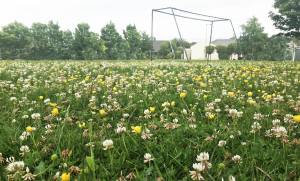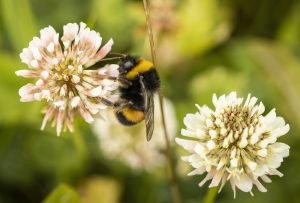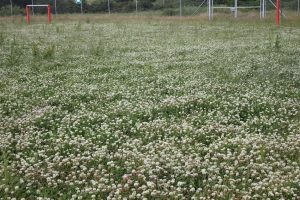
Over the summer holidays, schools are invited to help save the bees by taking part in ‘Pitches for Pollinators’.
This campaign aims to help Ireland’s pollinators like wild bees by leaving school pitches unmown over the summer, allowing wildflowers to emerge. These flowers provide a vital food source for pollinators, supplying them with the nectar and pollen they need to survive and raise the next generation.

What are pollinators and why are they important?
Pollinators are insects that visit flowers for nectar (for energy) and pollen (for protein). In doing so, they transfer pollen between flowers which brings about fertilization, allowing plants to reproduce.
On the island of Ireland, 78% of our wild plants are pollinated by insects, mostly wild bees. Around the world, 71% of the crops that provide 90% of the world’s food are pollinated by bees, so we need these important insects to grow the food that keeps us healthy.
Why are they in trouble and how can we help?
In Ireland, there are over 100 types of wild bee. One third of them is threatened with extinction. This is mainly because we have drastically reduced the habitats that provide them with food and shelter. Fortunately, there are simple actions we can take to help, and this is where schools come in.
Records submitted to the National Biodiversity Data Centre show that red and white Clover were among the most popular flowers for bees. By reducing mowing over the summer, we can encourage plants like these to appear in school pitches.
During term time, pitches and grassy areas are regularly mown giving children important areas to play. But over the summer holidays we are asking schools to mow less and leave ‘pitches for pollinators.’

How can my school get involved?
From the end of June until mid-August, leave pitches unmown to allow wildflowers to naturally grow. If this is not possible, consider mowing just once across this period.
When you do mow, remove the grass cuttings. Native wildflowers grow better in poorer quality soil. By removing the cuttings each summer, you will slowly reduce the soil fertility. This means that each summer the pitches will become more flower-rich for pollinators.
The summer pitch might look like long grass to humans, but chances are that amongst the grass there will be many flowers that will be lifesavers for our insects.
Further resources for schools
If you want to go further, you could create a School Pollinator Plan, or share the Junior Pollinator Plan with children. There are plenty of free resources, including lesson plans and activities, on the school pages of the All-Ireland Pollinator Plan website, pollinators.ie.
So, give the lawnmower a rest this summer and become part of a network of ‘pitches for pollinators’. Share photos of your pollinator-friendly pitch with us on Twitter or Instagram with the hashtag #PitchesForPollinators
The All-Ireland Pollinator Plan is a framework bringing together councils, businesses, schools, communities, farmers, and individuals across the island of Ireland to create a landscape where pollinators can survive and thrive. It is implemented by the National Biodiversity Data Centre which is a programme of the Heritage Council.
